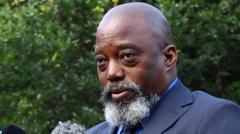Former President of the Democratic Republic of Congo, Joseph Kabila, has made his way back to the country after two years in self-exile, landing in the eastern city of Goma, which is currently under rebel control. Kabila, who served from 2001 to 2019, had been living in South Africa amidst accusations of supporting the M23 rebel group, backed by Rwanda, which has been actively fighting the Congolese army.
His return follows a recent move by senators to strip him of his immunity, intensifying scrutiny surrounding his alleged ties to the M23. Kabila has steadfastly denied any connection to the rebels, asserting that the current justice system is being manipulated for political gain. As one of DR Congo's longest-serving leaders, he took office after the assassination of his father, Laurent Kabila, and transitioned power to President Félix Tshisekedi in 2019, although relations between the two have since soured.
In conversation with BBC, a youth leader from Kabila's party, PPRD, expressed relief and joy at Kabila's return, describing him as a father figure. However, his political journey is marred as the PPRD faces a ban from authorities in Kinshasa over its perceived stance regarding the territorial issues with the M23. Rebel spokesperson Lawrence Kanyuka welcomed Kabila, wishing him well during his visit to the "liberated areas," highlighting the complex dynamics at play.
The Congolese government has accused Kabila of war crimes and treason, supporting claims with various documents and testimonies linking him to the rebels. In a recently deleted YouTube address, Kabila labeled the current government as a "dictatorship" and criticized a diminishing democratic environment within the country. Government spokesperson Patrick Muyaya dismissed Kabila's remarks, asserting the former leader has little to contribute to the national discourse.
The M23 insurgency, which initially resulted in a peace agreement in 2013, has resurged since 2021 due to disagreements over the implementation of promises made. Their resurgence has led to significant territorial gains in the resource-rich eastern DRC, resulting in the displacement of hundreds of thousands of civilians. Kabila's presence as he declares a return to active participation in finding solutions to this turmoil adds further tension to an already precarious situation in the DRC.
His return follows a recent move by senators to strip him of his immunity, intensifying scrutiny surrounding his alleged ties to the M23. Kabila has steadfastly denied any connection to the rebels, asserting that the current justice system is being manipulated for political gain. As one of DR Congo's longest-serving leaders, he took office after the assassination of his father, Laurent Kabila, and transitioned power to President Félix Tshisekedi in 2019, although relations between the two have since soured.
In conversation with BBC, a youth leader from Kabila's party, PPRD, expressed relief and joy at Kabila's return, describing him as a father figure. However, his political journey is marred as the PPRD faces a ban from authorities in Kinshasa over its perceived stance regarding the territorial issues with the M23. Rebel spokesperson Lawrence Kanyuka welcomed Kabila, wishing him well during his visit to the "liberated areas," highlighting the complex dynamics at play.
The Congolese government has accused Kabila of war crimes and treason, supporting claims with various documents and testimonies linking him to the rebels. In a recently deleted YouTube address, Kabila labeled the current government as a "dictatorship" and criticized a diminishing democratic environment within the country. Government spokesperson Patrick Muyaya dismissed Kabila's remarks, asserting the former leader has little to contribute to the national discourse.
The M23 insurgency, which initially resulted in a peace agreement in 2013, has resurged since 2021 due to disagreements over the implementation of promises made. Their resurgence has led to significant territorial gains in the resource-rich eastern DRC, resulting in the displacement of hundreds of thousands of civilians. Kabila's presence as he declares a return to active participation in finding solutions to this turmoil adds further tension to an already precarious situation in the DRC.


















